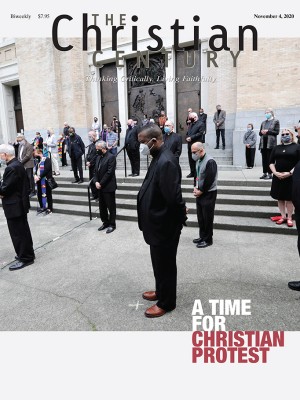A liberal daughter discusses White privilege with her conservative dad
What would happen if we listened to each other in love?

In a recent phone conversation, I proudly told my dad about my first book contract, which followed three years of hard work. “That’s great!” he said. “What’s it about?”
Sheepishly, I responded, “Well, it’s called Ten Risks Privileged People Should Take.”
“Just so you know,” he said, “I would not buy that book with that title.” He launched into an explanation of why, in his view, privilege doesn’t exist.
As usual, I cut him off. “Well, the book’s not for you. It’s not for people who voted for Trump! It’s for people who actually want to do some good in the world!” We ended the call in a huff.
My family’s failure to respectfully talk politics is hardly unique. Family ties add extra pressure to political conversations because everything the other person says feels so personal, even when it’s not.
A few years ago, a fun family dinner turned into an argument about Trump. I would have characterized my tone as strong. My eight-year-old daughter said I was shouting. Upset and tearful, she asked, “Why is Mommy shouting at Grandpa?” I try not to make my kid cry anymore. For the sake of our family relationships, my dad and I have avoided these tough conversations altogether.
I’ve never been satisfied with this avoidance, though. I’m increasingly convinced that our nation’s problems have been exacerbated because people of differing views simply can’t talk to each other. Conversations quickly devolve into shouting matches in which we throw phrases like weapons. “Check your privilege!” “All lives matter!” These arrows do little to inspire the reflection needed to learn—or to heal division.
Read our latest issue or browse back issues.
Master teacher bell hooks highlights the dangers of what she calls our dominator culture. We are socialized to assume there must always be a superior and an inferior party. People’s arguments don’t really matter, because we’re not really listening—we’re just fighting to win.
I feel the need to try to do better. So I decided to take the plunge. I asked my dad if we could have a real conversation about White privilege. I told him I want to be fair to those who hold more conservative views than mine. We set an appointment to video chat, at a time when both of us could be relaxed and undistracted. I meditated beforehand, took some deep, slow breaths, and then dialed my dad.
I started by asking where he had heard the term White privilege. He didn’t mention Peggy McIntosh’s “invisible knapsack” essay or point out that the concept of White privilege has been discussed for decades in academia. Dad heard about White privilege on the news—his favorite channel is Fox News—and from politicians like Beto O’Rourke, who he said was “on every channel apologizing for being White.”
“Privilege exists,” he said, surprising me. “It’s just not connected to race.” He thinks the term White privilege diverts attention from real inequities and potential solutions and provides people who aren’t White with an excuse for failure.
I defined privilege as an unearned advantage. He liked that and said he preferred the word advantage over privilege.
“I believe there are both unearned and earned advantages in life,” Dad continued. “Both provide the ability to affect things more easily or have more influence. Neither are connected to race. While certain individuals within a given race may have more advantages than others, all races contain a mix of advantaged and disadvantaged people. To suggest differences in degree are because of race is stereotyping and only leads to increased division. Is the son or daughter of a Black professional likely to have more unearned advantages than those of a White single mother? I think so. Are Asian Americans or those of Jewish faith more likely than White Protestants to achieve educational or financial success? If so, it is because they amassed more unearned and earned advantages—not because of their race or religion.”
I see Dad’s point. But in my mind, privilege emphasizes the unearned part more than advantage does. And I believe privilege is connected to race, because I recognize the unearned advantages my Whiteness affords: immunity from being racially profiled by the police or followed like a suspect while shopping in a store. I’ve read about Black parents giving their children White names so their resumes will more likely be considered.
But even Dad knew about “the talk” Black parents give their kids, instructing them how to behave when—not if—they are pulled over by police. When I brought this up, Dad said, “Now that’s real. And I wish it weren’t so.”
Dad believes privilege (or unearned advantage) is tied to money, education, and strong families. There’s a lot to unpack in his definition of a strong family. He affirms LGBTQ people and their right to marry. But he condemns “broken families” created by divorce, along with fathers who leave mothers to be single parents.
I grew up in the quintessential American nuclear family. Two kids. Dad worked. Mom stayed at home. According to Dad, if you have good parents, do well in school, and are willing to work hard, you can make it in America. He’s not alone. According to a 2019 Gallup poll, 70 percent of Americans believe the American dream is attainable. Dad acknowledges that it’s harder for African Americans. But, he adds emphatically, “I don’t accept that they are victims.”
Dad idealizes the American dream. To reject the idea that anyone can overcome obstacles and make it here is bad for the country—even, Dad says, his voice rising passionately, “bad for civilization.” He seems to interpret this talk of White privilege as a rejection of this American ideal.
I’m not against the American dream. Perhaps it serves as a way to imagine ourselves into a better future. But the dream is not attainable for everyone. Black people are agents of change, not mere victims. But they are indeed victimized by our nation’s long history of racism.
Throughout our conversation, my dad shared some Fox News–sounding phrases that made me cringe. In turn, I shared some liberal tropes that made him roll his eyes hard, his head thrown back in deep frustration. But we kept talking, because we kept surprising each other. I was finally listening, rather than cutting him off when he offended me. I couldn’t simply label Dad a “Trump conservative” and assume that was all I needed to know.
And the more I listened, the more I realized that the debate about privilege isn’t an abstract one for my dad. It’s personal.
“I don’t accept that the plight of Black people is all my fault,” Dad said. To him, White privilege feels like a slap in the face, a rejection of all he’s done to support and encourage the Black people around him. “I am personally very disheartened,” he said. “I spent a career trying to remedy race relations after the Detroit riots.”
The bank Dad worked for, the National Bank of Detroit, played a lead role in addressing local inequities. Dad was proud of the work they did. “NBD dedicated about 20 to 40 of their employees to doing nothing but community work. We built housing. Stimulated hiring. Partnered with other businesses and community organizations. A lot of progress was made.”
Growing up, I wasn’t interested in my dad’s career. Banking bored me. Little had I known about how Dad used his privilege to help others.
“I hired and promoted African Americans,” he said. “I’ve been involved in funding housing projects. I’ve advocated for and supported tutoring and mentoring programs, and I’ve seen so much progress and so many African Americans achieve in business and in life, many of whom are now my good friends. And what we’re hearing now about White privilege and how these ‘victims’ are being smashed down tells me that the last 30 years of my life have been wasted. And that, frankly, for the first time in my life is making me close to a racist. I am turning my back. It is hardening my views materially.”
Some may read Dad’s words as a defensive brag, a White man looking to justify his privilege by touting his good works. But that’s not my dad. I’m 48 years old, and this was the first I’d heard of the specific work Dad did to promote Black people. As it turns out, Dad believes in affirmative action as a societal good, a position many of his fellow Republicans reject.
I hear my father’s lament that his views are hardening; that as our rhetoric divides and stereotypes people, he finds himself turning his back on people he knows need help, feeling he’s being told his kind of help isn’t right or needed.
I lament his hardening, too. When we harden our positions, become unwilling to entertain different views, and turn our backs, nothing gets better. As much as I disagree with many of his positions, I want my dad in this conversation. I want him in this fight to help Black lives matter more. I’ve read more antiracist books than Dad has. I know more about the origins of White privilege and how educators use the term. But Dad’s got a lifetime of experiences and knowledge that I, and others, can benefit from as well. I’ve read our history, but he’s lived it.
After we ended our call, I felt good. Dad and I hadn’t screamed at each other. We didn’t hang up in a huff. I was left feeling like I’d actually try talking politics with him again.
“Cultures of domination rely on the cultivation of fear,” writes bell hooks, leading us to choose safety and sameness over difference and diversity. She encourages love as the antidote to fear, quoting 1 John 4:18: “There is no fear in love; but perfect love casteth out fear.” Much of hooks’s work is grounded in this love ethic which, she says, is lived out through care, commitment, respect, and knowledge.
In difficult conversations like these, in which you’re bound to disagree, the advice is always to find values held in common, commitments you both share. My dad and I share an ethic of love. I am a minister because he and my mom raised me in a church that taught me that loving God meant loving my neighbor.
Talking politics with family is tense. It feels like walking through a field full of hidden land mines. But familial relationships are more grounded in love than other relationships—a love that can be relied upon when disagreements arise. As much as my dad and I disagree, we love each other. When we ground ourselves in this ethic and commit to it, seeking to listen, respect, and come to understand, we ward off the temptation to dominate, to become hard and uncompromising.
The next day I called my dad again, just to check in. My parents are sequestered in a Florida retirement community, and we’re all worried about COVID-19.
“Oh good!” Dad said, “It’s you. I was afraid you’d be mad at me after our conversation yesterday.”
“No, Dad. I thought it was a great conversation.”
“Me too. I really appreciated it.”
Being able to talk politics with my dad isn’t going to solve our nation’s problems. But we all need spaces, relationships, and communities where we can express ourselves and our ideas, knowing that we won’t be rejected if disagreements arise. Family can be such a place—if we don’t seek to dominate, don’t divide ourselves into winners and losers, superior and inferior. If we cast out our fear and soften with love.
A version of this article appears in the print edition under the title “Family politics.”






